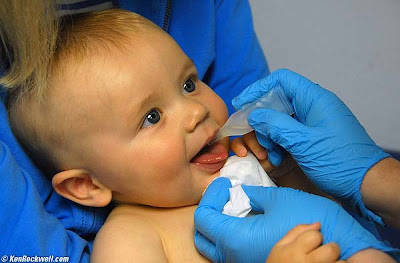There are babies born who won’t be able to celebrate their first birthdays. Did you know 13 kids die in the Philippines every day because of a seemingly trivial condition? Unfortunately, not a lot of parents are aware that diarrhea is the second leading killer of children aged less than five years old. This statistic has been reported in an article entitled “Global, regional, and national causes of child mortality in 2008: a systematic analysis” which came out in The Lancet (2010).
 |
| Photo borrowed from gavialliance.org |
The World Health Organization (WHO) and UNICEF likewise confirms that 1,500 children around the globe die daily because of rotavirus-related diarrhea. But that’s not all. Children who escape death are not home-free because diarrhea affects nutrient absorption which leads to lasting impact on the growth and development of a child.
In fact, growth discrepancies of up to 8.2 cm by age seven have been attributed to early childhood diarrhea with profound effects on fitness, cognition, and schooling as observed in children who have experienced regular spells. Sadly, the calculations show that kids who regularly suffer from diarrhea in the first two years of life can lead to a loss of 10 IQ points and 12 months of schooling by age nine.
Part of the eight Millennium Development Goals (MDGs) set by the United Nations include lowering children mortality by saving them from rotavirus-related deaths. This counts among the most important missions every country should take since the disease is highly preventable through vaccination. WHO’s Strategic Advisory Group of Experts (SAGE) recommends that rotavirus vaccination be included in all national immunization programs, especially in countries where diarrhea deaths account for more than 10% of deaths in children younger than five.
 |
| Photo borrowed from medtips.in |
One of the key health policy directions of the Aquino administration is the attainment of MDG 4, specifically the reduction of infant mortality rate. In a lecture delivered by Department of Health Secretary Enrique T. Ona at the 2nd Philippine Outlook Forum last October, it was established that rotavirus vaccination is needed to achieve the country’s goal to lower the statistics. By preventing diarrheal deaths among children through rotavirus shots, the country will be able to substantially reduce its overall child mortality and be nearer the achievement of the fourth MDG by 2015.
“We need to be serious about saving our children from the grip of this burdensome but highly preventable disease,” says Dr. Salvacion Gatchalian, Director, Clinical R & D and Medical Affairs for GlaxoSmithKline Philippines. “And there is no better way than to vaccinate our children to protect them from rotavirus, the most common cause of diarrhea, which accounts for 12% of deaths among children under five in the Philippines.” She is hopeful that, if properly implemented, the Philippines may be the very first country in Asia to included rotavirus vaccination in our national immunization program.
Thirteen children died yesterday, thirteen died today, and another thirteen will die tomorrow from diarrhea-related illnesses. With the rotavirus vaccine, millions of innocent lives will not have the same ending. If you are a parent of a child below five years old, do ask your pediatrician for more information about the rotavirus vaccine. It might just save your child's life.






No comments:
Post a Comment